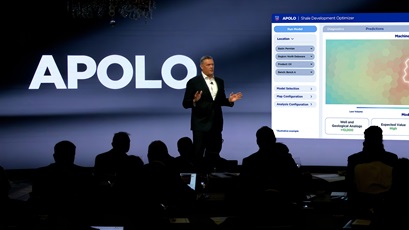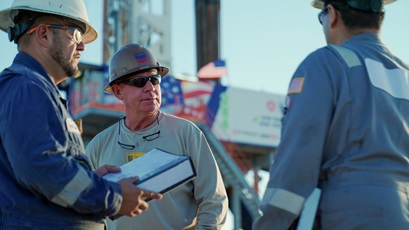our operations
lower-carbon progress is in the pipeline
1 min read | july 21, 2022
Moving oil and gas by pipeline rather than trucks in Colorado is helping Chevron work toward meeting its carbon emissions targets while enhancing safety on local roadways.
going off road
Until recently, trucks were a common sight in our operations in the Denver-Julesburg (DJ) Basin, a large geological formation in northeastern Colorado and southeastern Wyoming. Trucks were used to carry away the oil, condensate and water we were producing.
In 2018, Noble Energy – a company acquired by Chevron in 2020 – implemented a comprehensive plan for new development spanning more than 100 square miles using pipeline infrastructure and reducing our reliance on trucks for takeaway.
why it all matters
“Our goal is to deliver lower carbon intensity products,” said facilities engineer manager Luke McCartney. “Chevron is different by design. We understand the importance of protecting the environment. We are responsibly producing the energy the world needs and it is our goal every single day.”
more on that
In addition to outgoing traffic, incoming truck traffic will soon be in our rearview mirror in the DJ Basin. While transports deliver diesel to power our drilling operations, we’re aiming to eliminate the need for those shipments by phasing out diesel and replacing it with electricity where possible.
the long view
By using pipelines instead of trucks to transport oil and natural gas from our Mustang development area, we will eliminate more than 152 million truck miles and associated emissions.
topics covered
related content
-

 how APOLO helps chevron pinpoint prime drilling locations
how APOLO helps chevron pinpoint prime drilling locationsour operationsnovember 12, 2025
-

 robotics supports more efficient workplace
robotics supports more efficient workplaceour operationsnovember 10, 2025
-

 the people who power the US energy advantage
the people who power the US energy advantageour operationsnovember 06, 2025
-

 a statement from chevron CEO mike wirth on Argentina
a statement from chevron CEO mike wirth on Argentinaour operationsseptember 24, 2025
chevron email updates
Subscribe to our newsletter to receive news and updates.



